Leaving Facebook offers not only financial savings but also a substantial enhancement in personal privacy. By opting out of the platform, users can avoid hidden costs associated with targeted advertising and data management, while also reducing their exposure to data breaches. Additionally, stepping away from social media can lead to emotional benefits, fostering a sense of freedom and improved well-being.
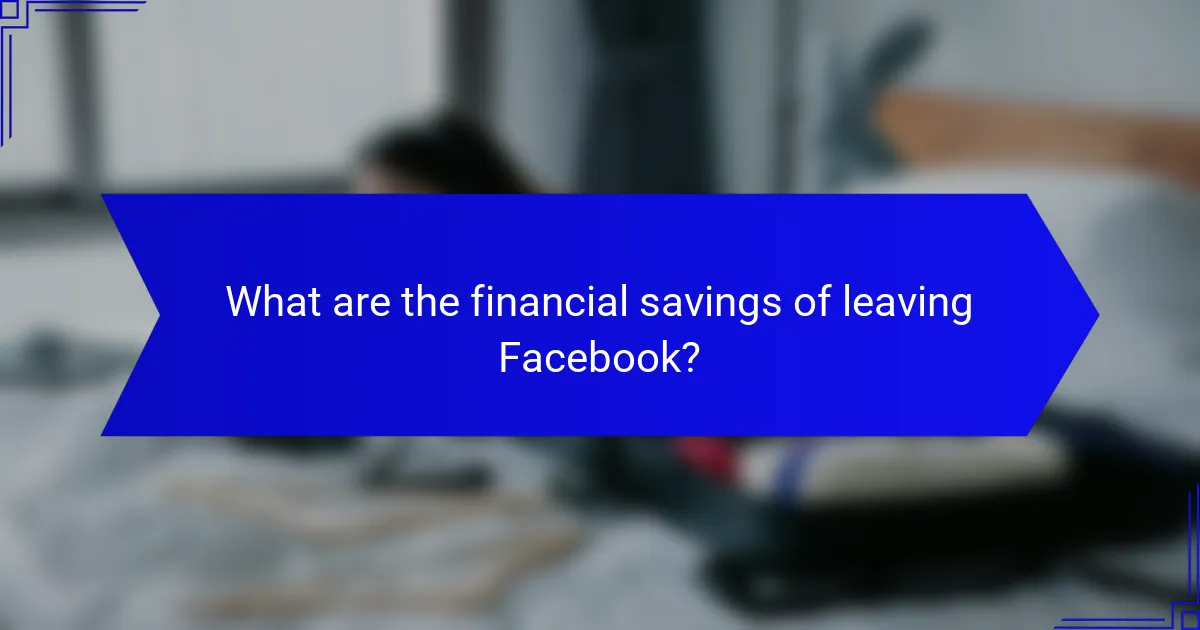
What are the financial savings of leaving Facebook?
Leaving Facebook can lead to significant financial savings by reducing advertising costs, lowering data privacy expenses, and increasing personal savings. By opting out of the platform, users can avoid the hidden costs associated with targeted advertising and data management.
Reduced advertising costs
When you leave Facebook, you eliminate the need to pay for advertising on the platform, which can be a considerable expense for businesses and individuals alike. Many small businesses spend hundreds to thousands of dollars monthly on Facebook ads to reach their target audience.
By shifting your marketing strategy to organic methods or other platforms, you can save these advertising costs. Consider using email marketing or local community events as cost-effective alternatives to reach potential customers.
Lower data privacy expenses
Data privacy is a growing concern, and many users incur costs to protect their information while using platforms like Facebook. These expenses can include subscriptions to VPN services, identity theft protection, or data monitoring services.
By leaving Facebook, you can reduce or eliminate these privacy-related expenses. Instead, focus on using secure, privacy-respecting platforms that do not require additional spending on protective measures.
Increased personal savings
Leaving Facebook can lead to increased personal savings by reducing impulse spending driven by social media. Users often make purchases based on ads or peer influence, which can add up over time.
Without the constant exposure to targeted ads and social comparisons, you may find it easier to stick to a budget and save more. Consider tracking your spending habits to see how much you can save by avoiding social media influences.
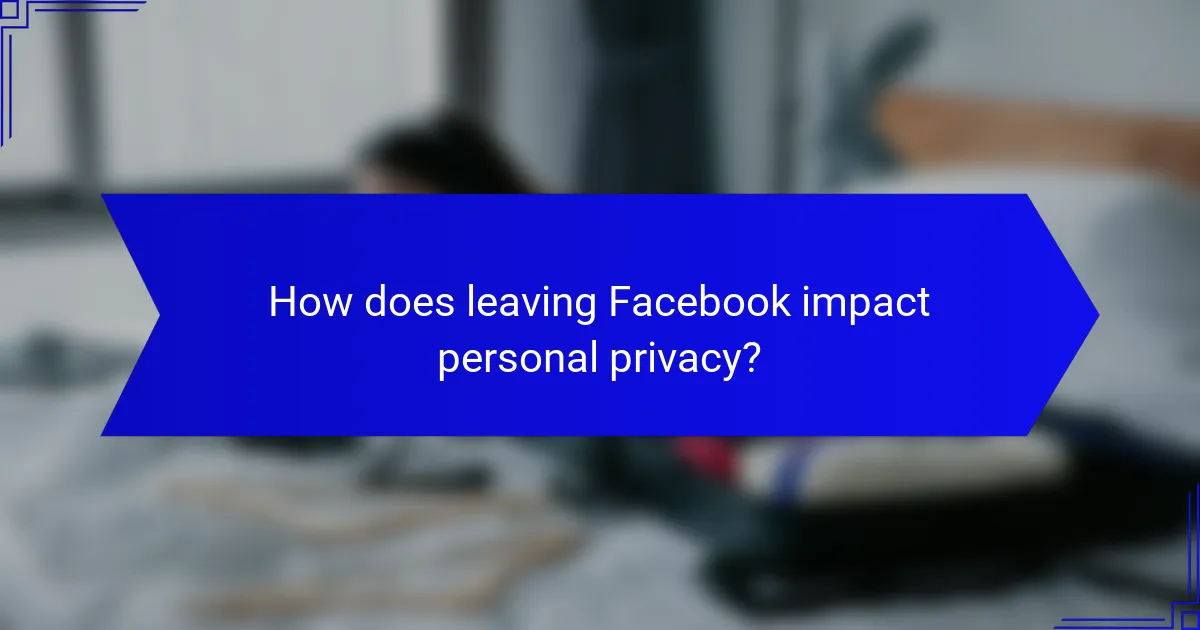
How does leaving Facebook impact personal privacy?
Leaving Facebook significantly enhances personal privacy by reducing the amount of personal data collected and shared. Without an account, users limit their exposure to data breaches and targeted advertising practices that often exploit user information.
Enhanced data security
When you leave Facebook, your personal data is no longer stored on its servers, which reduces the risk of data breaches. Many high-profile incidents have shown that large platforms can be vulnerable to hacks, exposing user information to malicious actors.
Additionally, without a Facebook account, you are less likely to be tracked across the internet by third-party advertisers using Facebook’s data-sharing agreements. This creates a more secure online experience, as your browsing habits and personal information remain private.
Less targeted advertising
Leaving Facebook leads to a decrease in personalized ads, as advertisers can no longer access your profile data. This means you will see fewer ads tailored to your interests, which can be a relief for those who find targeted advertising intrusive.
While this may result in a less customized online experience, it also means that your online activities are less monitored. Many users prefer this trade-off, valuing privacy over the convenience of personalized content.
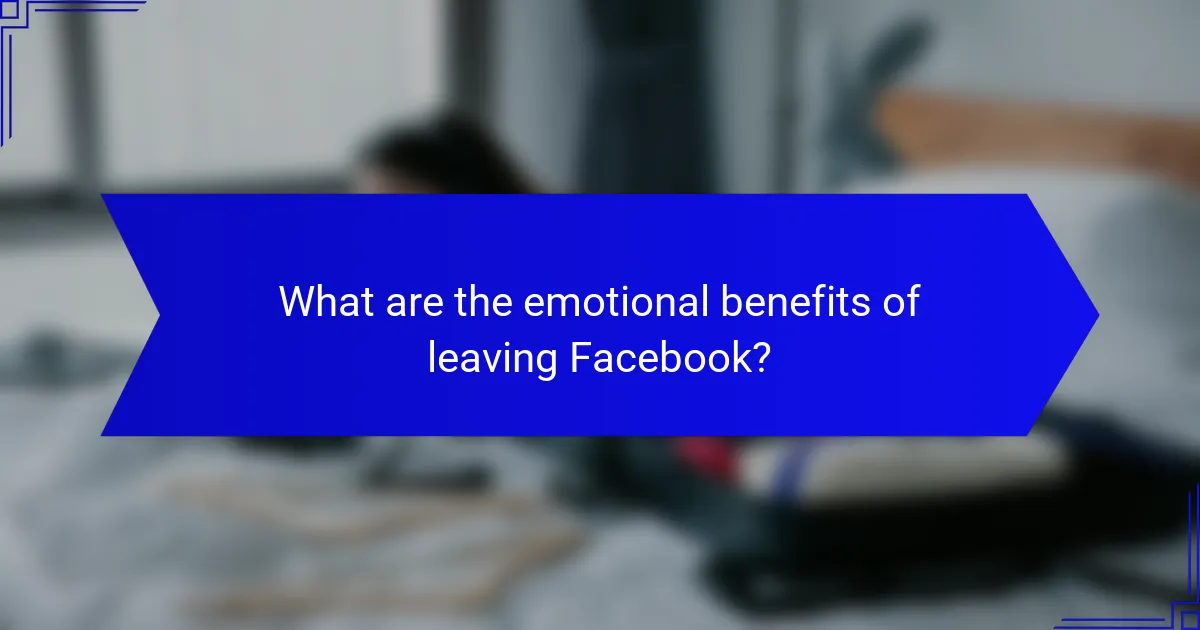
What are the emotional benefits of leaving Facebook?
Leaving Facebook can lead to significant emotional benefits, including reduced anxiety and improved overall well-being. By stepping away from the platform, individuals often experience a sense of freedom and relief from the pressures of social media interactions.
Improved mental health
Quitting Facebook can enhance mental health by reducing feelings of inadequacy and comparison. Many users report lower levels of anxiety and depression after leaving, as they are no longer bombarded by curated images and posts that can distort reality.
Additionally, distancing oneself from social media can lead to better sleep patterns and decreased stress levels. This shift allows for more focus on personal growth and self-care, which are essential for maintaining mental wellness.
Increased time for meaningful interactions
Leaving Facebook frees up time that can be redirected toward more meaningful, face-to-face interactions. Instead of scrolling through feeds, individuals can engage in activities that foster deeper connections with family and friends.
This time can be spent on hobbies, outdoor activities, or simply having conversations without the distractions of notifications. By prioritizing real-life relationships, individuals often find greater satisfaction and fulfillment in their social lives.

What alternatives exist to Facebook?
Several alternatives to Facebook cater to different social and professional needs. Users can choose platforms like Instagram for casual sharing or LinkedIn for career-focused networking, each offering unique features and user experiences.
Instagram for social sharing
Instagram is a visual platform primarily focused on photo and video sharing, making it ideal for users who enjoy sharing moments with friends and family. It allows users to post images, stories, and reels, fostering engagement through likes and comments.
When considering Instagram, be aware of its emphasis on aesthetics and trends. Users should curate their content to attract followers and maintain engagement, which may require regular updates and creativity. Privacy settings are crucial; users should review them to control who sees their posts.
LinkedIn for professional networking
LinkedIn serves as a dedicated space for professional networking, allowing users to connect with colleagues, industry leaders, and potential employers. It features profiles that showcase work experience, skills, and endorsements, making it a powerful tool for career advancement.
To maximize LinkedIn’s benefits, users should actively engage with content relevant to their field, join industry groups, and participate in discussions. Regularly updating your profile and networking with connections can lead to job opportunities and professional growth. Remember to maintain a professional tone and be mindful of the information shared.
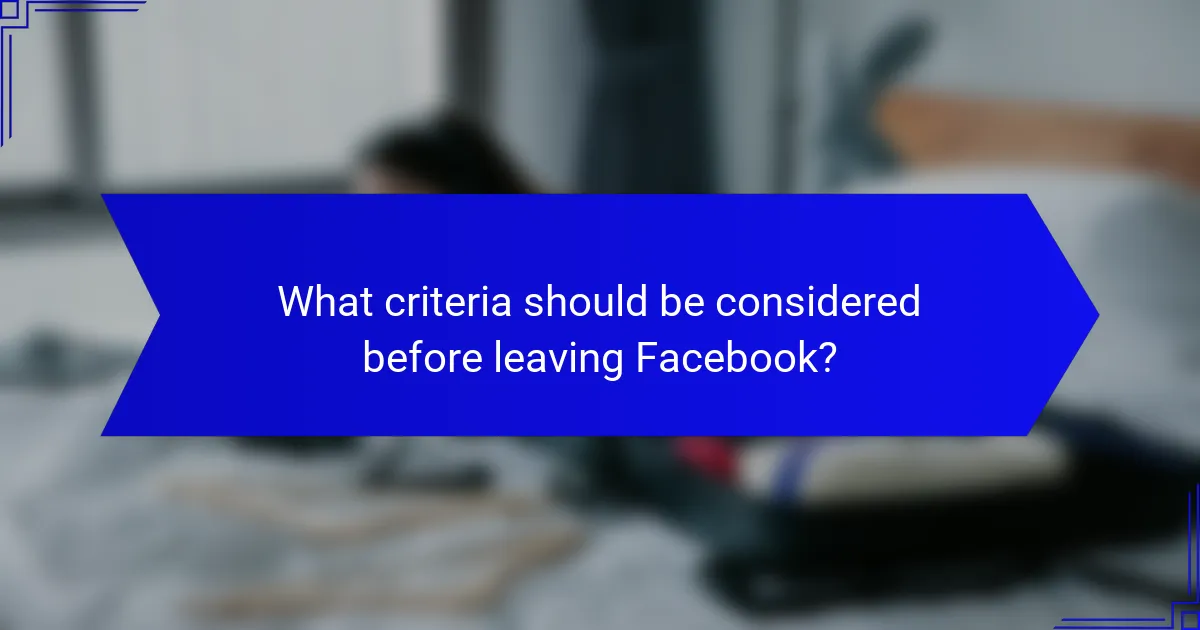
What criteria should be considered before leaving Facebook?
Before leaving Facebook, consider your social connections, the platforms you might switch to, and the potential impact on your online presence. Assessing these factors will help you make an informed decision about whether the benefits of leaving outweigh the drawbacks.
Assessing social connections
Evaluate how leaving Facebook will affect your relationships with friends, family, and professional contacts. Many people use Facebook as a primary means of communication, so consider whether you can maintain these connections through other channels.
Think about the groups and communities you are part of on Facebook. If you are involved in specific interest groups or local events, ensure you have alternative ways to stay updated or participate without the platform.
Evaluating alternative platforms
Research other social media platforms that align with your needs and values. Options like Instagram, Twitter, or LinkedIn may offer different features that could suit your social interaction preferences better.
Consider the privacy policies and data practices of these alternatives. Some platforms may provide better privacy controls or less intrusive advertising, which can enhance your overall online experience.
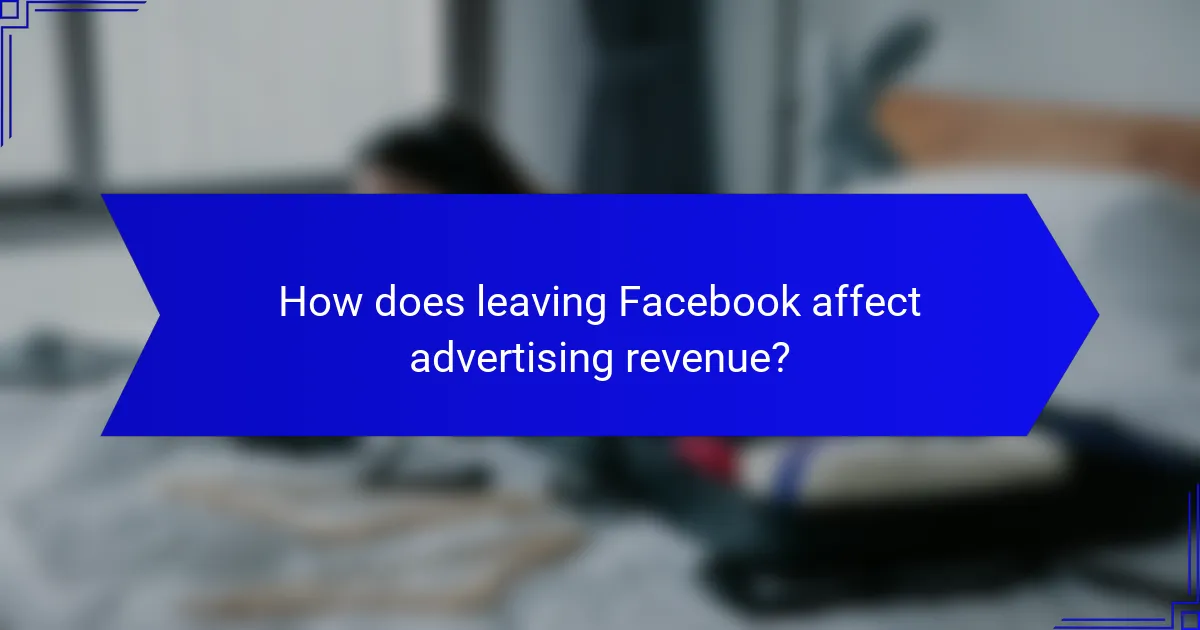
How does leaving Facebook affect advertising revenue?
Leaving Facebook can significantly impact advertising revenue for both the platform and businesses that rely on it. When users exit, Facebook loses potential ad impressions and clicks, which can lead to decreased revenue from advertisers targeting those users.
Impact on small business marketing
Small businesses often depend on Facebook for cost-effective marketing strategies. Without access to Facebook’s vast user base, these businesses may face challenges in reaching their target audience, potentially leading to reduced sales and brand visibility.
To adapt, small businesses can explore alternative marketing channels such as local SEO, email marketing, or other social media platforms. Diversifying marketing efforts can help mitigate the loss of Facebook’s advertising reach.
Changes in display advertising strategies
With fewer users on Facebook, advertisers may need to adjust their display advertising strategies. This could involve reallocating budgets to other platforms like Google Ads, Instagram, or TikTok, which may offer different audience engagement opportunities.
Advertisers should consider testing various platforms to identify where their target demographics are migrating. A/B testing different ad formats and messages can help optimize campaigns for better performance in the absence of Facebook’s audience.
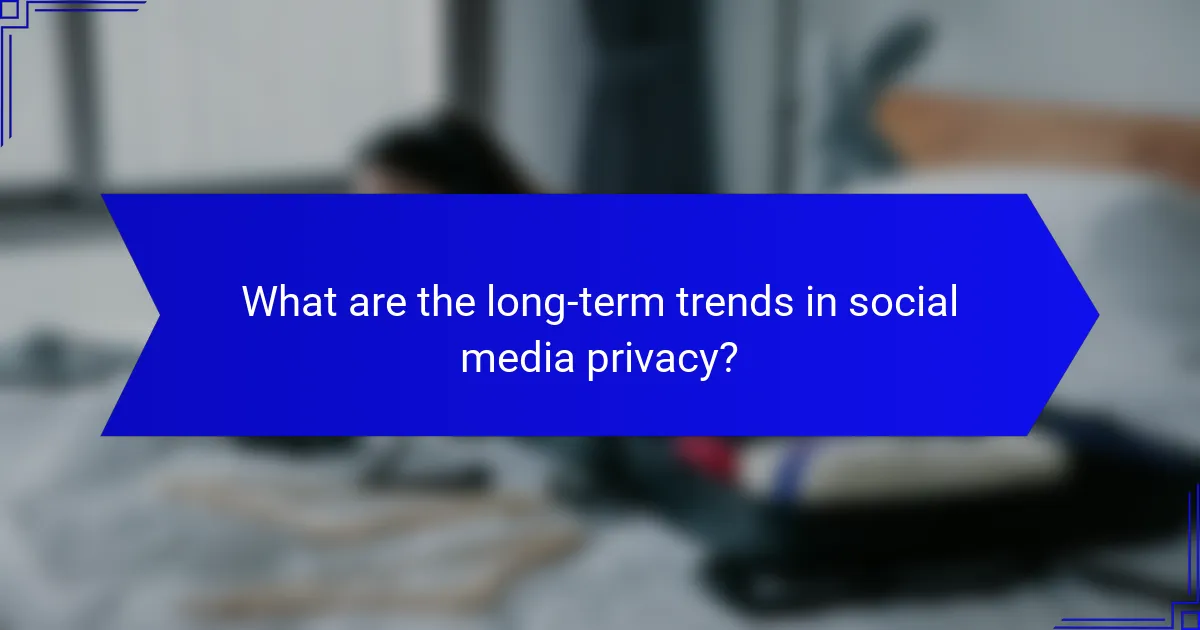
What are the long-term trends in social media privacy?
Long-term trends in social media privacy indicate a growing emphasis on user data protection and transparency. As concerns about data misuse rise, both regulatory frameworks and user preferences are shifting towards more secure and private online environments.
Emerging privacy regulations
Emerging privacy regulations are reshaping how social media platforms handle user data. Laws such as the General Data Protection Regulation (GDPR) in Europe and the California Consumer Privacy Act (CCPA) in the United States mandate stricter data handling practices, giving users more control over their personal information.
These regulations often require companies to implement clear consent processes and provide users with the ability to access, modify, or delete their data. Non-compliance can lead to significant fines, incentivizing platforms to prioritize privacy.
Shift towards decentralized platforms
The shift towards decentralized platforms is gaining traction as users seek alternatives to traditional social media. These platforms, which operate on blockchain technology, offer enhanced privacy by allowing users to control their data without relying on a central authority.
Examples include platforms like Mastodon and Diaspora, which emphasize user autonomy and data security. While decentralized options may not yet match the user base of mainstream platforms, they represent a significant movement towards prioritizing privacy and user rights in the digital space.

What are the future implications of leaving Facebook?
Leaving Facebook can lead to significant changes in your online privacy and social interactions. While you may gain more control over your personal data, you might also miss out on social connections and information sharing that the platform provides.
Financial savings from leaving Facebook
Leaving Facebook can result in financial savings, particularly if you reduce spending on ads or promotions that target Facebook users. Additionally, by avoiding potential data breaches, you may save on costs associated with identity theft recovery or credit monitoring services.
Consider the indirect savings as well; without Facebook, you may find yourself less influenced by consumerism driven by targeted ads, potentially leading to more mindful spending habits. This can contribute to a more stable financial situation over time.
Value of privacy and personal data
The value of your privacy and personal data has become increasingly recognized in today’s digital landscape. By leaving Facebook, you reclaim ownership of your information, which can be worth a considerable amount, especially if you consider the potential for misuse or exploitation.
Many users underestimate the worth of their personal data. In a world where data is often monetized, protecting your privacy can be seen as an investment in your future security and peace of mind.
Social implications of leaving Facebook
Leaving Facebook may alter your social dynamics, as many people use the platform to stay connected. You might miss out on events, updates, and community interactions that are primarily shared through Facebook.
However, this can also encourage you to seek alternative ways to connect, such as through direct messaging, email, or other social platforms. Building relationships outside of Facebook can lead to deeper and more meaningful interactions.
